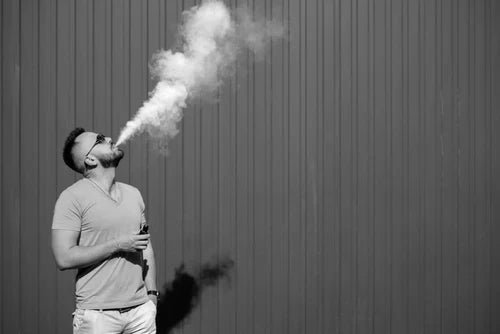
What is Sub-ohm Vaping? Everything You Need to know
Andres RomanShare
Sub-ohm vaping has become a popular trend among experienced vapers looking for larger clouds, stronger flavor, and a more intense experience. But if you're new to vaping or still learning the basics, "sub-ohm" might sound confusing or even a bit intimidating.
This guide breaks down everything you need to know about sub-ohm vaping—from what it is and why people do it to how to get started safely and effectively.
What Is Sub-Ohm Vaping?
Sub-ohm vaping refers to using a vape device with a coil that has a resistance of less than 1.0 ohm. The term “sub-ohm” simply means “below one ohm.”
In vaping, resistance (measured in ohms, Ω) affects how much current flows through the coil. A lower resistance coil allows more electricity to flow through, which produces higher wattage, more heat, and ultimately, larger clouds of vapor.
Why Do People Use Sub-Ohm Devices?
Sub-ohm vaping isn’t just about cloud chasing—although that is one of the main appeals. Here are several reasons people turn to sub-ohm setups:
1. Increased Vapor Production
Sub-ohm devices are ideal for those who want dense, billowy clouds. This is particularly popular among hobbyists or competitive vapers.
2. Stronger Flavor
With more e-liquid being vaporized at once, the flavor becomes more intense and fuller, making it a preferred option for flavor enthusiasts.
3. Warmer Vapor
Because the coil heats up more, sub-ohm vaping generally produces warmer vapor compared to standard coils.
4. Direct-to-Lung (DTL) Inhale
Sub-ohm devices are designed for DTL inhaling, where the vapor goes directly into the lungs (similar to taking a deep breath), offering a more powerful experience than mouth-to-lung (MTL) draws.
How Sub-Ohm Vaping Works
Sub-ohm vaping relies on Ohm’s Law, a fundamental principle in electronics that describes the relationship between voltage (V), current (I), and resistance (R). When resistance is lowered, more current flows through the coil, increasing the wattage and producing more vapor.
Modern regulated vape mods handle the electrical calculations for you and have built-in protections. But understanding the basics of resistance helps you choose the right coils and settings for your vaping style.
What You Need for Sub-Ohm Vaping
To get started with sub-ohm vaping, you’ll need the right combination of hardware and e-liquid:
✅ Sub-Ohm Tank or RDA/RTA
- Sub-ohm tanks come with pre-built coils (usually between 0.1–0.5 ohms).
- RDAs (Rebuildable Dripping Atomizers) and RTAs (Rebuildable Tank Atomizers) let you build and install your own coils for customized resistance.
✅ Powerful Box Mod
You’ll need a device capable of producing enough wattage—usually 40 watts or higher—to support low-resistance coils.
✅ Batteries (High Amp Rating)
Use high-drain batteries with a sufficient amp limit. Battery safety is crucial in sub-ohm vaping to prevent overheating or malfunction.
✅ Low-Nicotine, High-VG E-Liquid
- Sub-ohm vaping requires e-liquids with a VG content of 70% or higher to produce thick vapor.
- Since more vapor is inhaled, use lower nicotine levels (typically 3mg or 6mg) to avoid discomfort or nicotine overload.
Factors That Affect Sub-Ohm Performance
Several components influence how effective and enjoyable your sub-ohm vape will be:
🔸 Coil Resistance
Lower resistance coils (like 0.2Ω or 0.3Ω) will produce more vapor and heat, but require more power and careful battery matching.
🔸 Wattage Settings
Higher wattage generates more vapor but can also reduce coil life and drain your battery faster. Always stay within the recommended wattage range for your coil.
🔸 Airflow
Increased airflow helps cool the coil and makes direct-to-lung inhales more comfortable. Most sub-ohm tanks feature adjustable airflow systems.
🔸 Wicking Material
Organic cotton, mesh coils, and other high-quality materials improve flavor and vapor consistency.
The Best E-Liquid for Sub-Ohm Vaping
When choosing vape juice for sub-ohm devices, look for these characteristics:
- High VG Content: VG (Vegetable Glycerin) is responsible for vapor production. Look for 70% VG or more.
- Low Nicotine: Sub-ohm vapes deliver more vapor per puff, so using low nicotine e-liquids (3mg or less) ensures a smooth experience.
- Strong Flavor Profiles: Because sub-ohm setups enhance flavor, bold and complex blends often perform best.

Final Thoughts
Sub-ohm vaping offers a more intense and flavorful experience compared to traditional MTL vaping, but it requires the right equipment and knowledge. Whether you're looking to produce large clouds or explore deeper flavor nuances, sub-ohm vaping can be a satisfying next step—provided you understand how it works and vape responsibly.
Be sure to:
- Use high-quality hardware and batteries
- Choose the correct e-liquid for your setup
- Stay within safe wattage and resistance ranges
📘 Continue Learning
Want to level up your vape knowledge? Check out these helpful guides:
- Disposables VS Pod Systems – Which one fits your lifestyle best?
- The Complete Beginner’s Guide to Vaping – Start your vape journey the right way.
- How to Clean a Vape (Without Losing Your Mind) – Yes, it can be easy.
- How To Prime A Coil – Make every puff count and avoid dry hits.
- Mesh Coil VS Regular Coil: Which One Is Better? – Pros, cons, and flavor comparisons.
- How To Clean a Vape Coil – Extend coil life with proper cleaning.
- How To Clean a Vape Tank – Keep your flavor fresh and your tank gunk-free.
